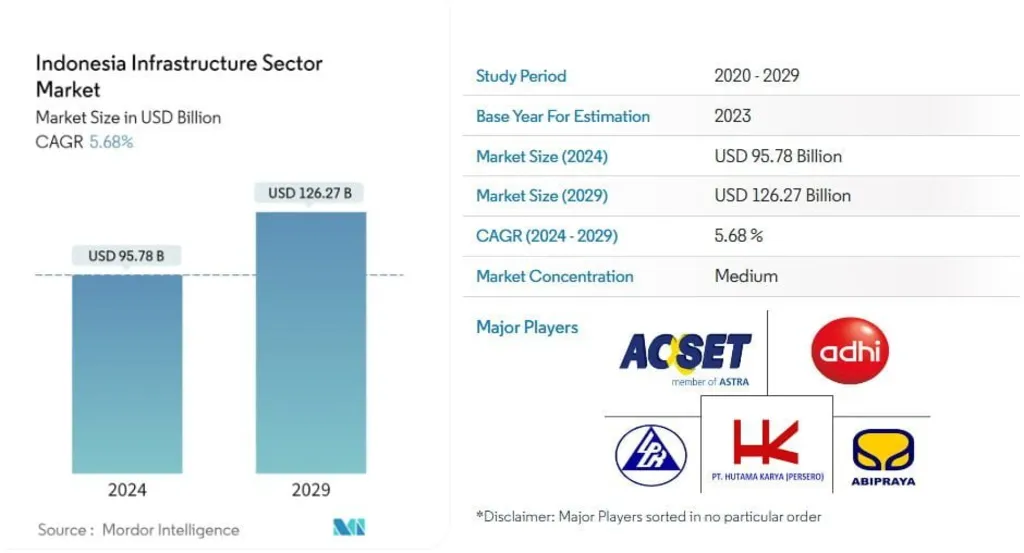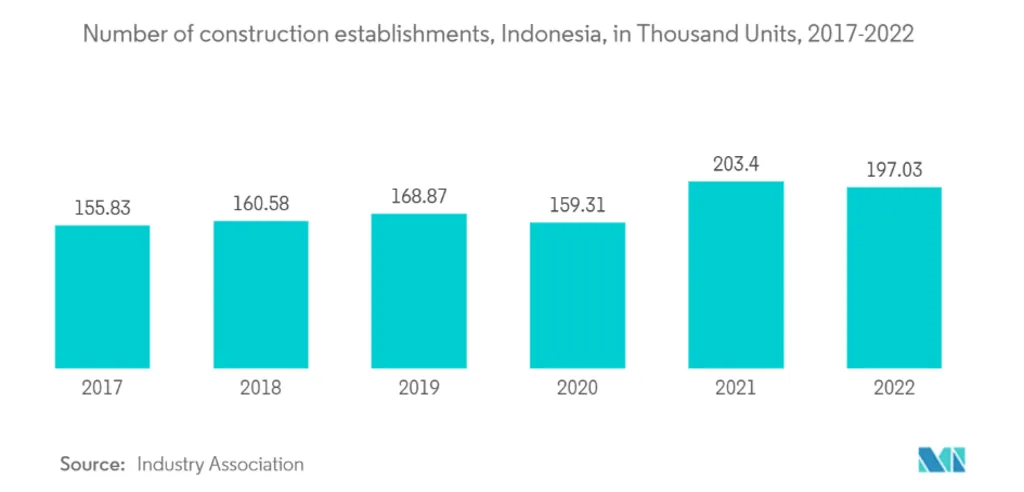Indonesia’s Infrastructure Market Growth: Insights and Analysis
Indonesia stands as a pivotal player in the global economic landscape, boasting a dynamic infrastructure sector. As of 2024, the Indonesia Infrastructure Sector Market is valued at approximately USD 95.78 billion, a figure projected to ascend to USD 126.27 billion by 2029, marking a notable CAGR of 5.68% during this five-year period. This growth trajectory is underpinned by the nation’s vast population and robust domestic demand, both pivotal drivers fostering a conducive environment for economic expansion within Indonesia’s infrastructure domain. This landscape beckons stakeholders, ranging from investors and developers to policymakers, to leverage insights and guidance from Indonesia construction consulting services, facilitating informed decision-making and strategic planning.
Indonesia’s demographic prowess, with a population exceeding 250 million and a substantial urban populace, positions the country as an enticing market for infrastructure development. The burgeoning middle class, characterized by increasing affluence, fuels GDP growth, with private consumption contributing significantly—accounting for approximately 60% of the GDP.

Emerging Trends in the Local Construction Market
Within Indonesia’s infrastructure domain, noteworthy trends are shaping the market landscape. The civil construction sector, constituting the fourth-largest GDP contributor, witnesses substantial investment inflows, notably surpassing other Asian counterparts. Government initiatives aimed at bolstering infrastructural connectivity across Indonesia, particularly on Java Island—home to Jakarta, the capital city—have catalyzed sectoral growth over the past few decades. Despite regional expansions, Java Island’s completed development projects far exceed those of other regions like Bali and Papua, highlighting the ongoing infrastructural focus.
Government Endeavors and Market Investment
Indonesia’s government has exhibited a steadfast commitment to infrastructure development, amplifying investments to USD 429.7 billion (2020-2024), marking a 20% surge from the previous phase (2015-2019). Notably, post-COVID-19 recovery spurred robust production gains in 2021, galvanizing the nation’s infrastructural momentum. Key allocations, such as IDR 414 trillion (USD 28.5 billion) in the 2021 state budget, signify a substantial push towards upgrading vital infrastructure elements like roads, airports, and seaports—stimulating demand for construction materials and equipment.

Geographical Expansion and Project Diversity in Infrastructure Landscape
An emerging trend within Indonesia’s infrastructure landscape is geographical diversification, aiming to decentralize business hubs away from Java. Collaborations with international entities, such as recent talks with Beijing, envision strategic projects spanning North Kalimantan, Central Kalimantan, North Sumatra, North Sulawesi, and Bali—encompassing hydropower plants, industrial parks, and port expansions. Noteworthy initiatives like the New Priok Port underline Indonesia’s commitment to enhancing infrastructural quality and capacity.
Market Leadership and Collaboration in Indonesia
The Indonesia Infrastructure Sector Market, characterized by a diverse array of regional and local players, anticipates robust growth fueled by escalating infrastructural projects. Market leaders such as PT. Acset Indonusa TBK, PT. Adhi Karya (Persero) TBK, and PT. Brantas Abipraya (Persero) spearhead this momentum. Moreover, strategic collaborations leveraging Public-Private Partnerships (PPPs) fortify Indonesia’s infrastructural landscape, attracting substantial public and foreign private investments—augmenting sectoral growth prospects.
Indonesia Construction Sector Consulting Services
As Indonesia’s infrastructure sector evolves amidst dynamic market forces, strategic insights and partnerships become paramount. Collaborations with Indonesia construction consulting services not only offer nuanced market understanding but also ensure alignment with broader economic imperatives, fostering sustainable growth within Indonesia’s construction ecosystem. By navigating these multifaceted dynamics and embracing strategic partnerships, stakeholders can capitalize on Indonesia’s vibrant infrastructure market, contributing to the nation’s economic resilience and prosperity.






